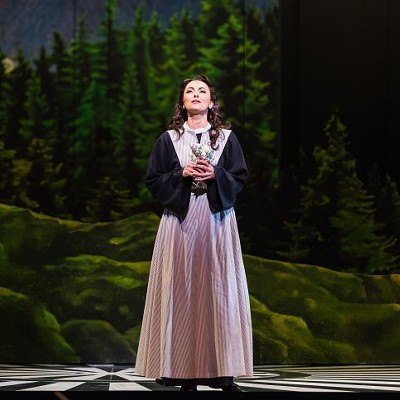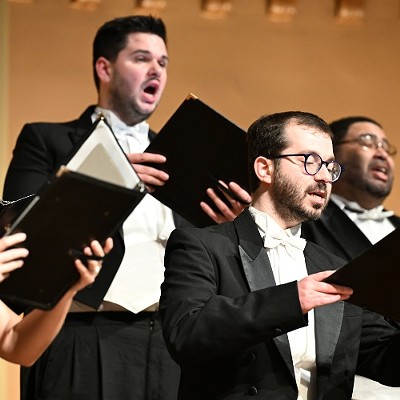Pictures of Black civil rights leaders pepper the forest green walls of the office on stage. The office bulletin board is haphazardly scattered with various community events. Papers littered over an office desk. Everything is reminiscent of a workplace except the big brown rectangular box that can’t help but call attention to itself. Did somebody die?
In this world premiere production of Stagolee and the Funeral of a Dangerous Word by Thomas Meloncon, it doesn’t take long to discern what the dangerous word is. Is there any other word in American English that conjures up its own meaning without even having to utter it in its entirety. Ask someone what the T-word is. Be prepared for various responses and confused faces. Ask someone what the N-word is. Be prepared for a silence that rings just as loud as the six letter word.

Stagolee (Timothy Eric) and Naomi (LaKeisha Rochelle Randle) speaking about the town's most recent race riot.
Photo by Pin Lim / Forest Photography.
With any new play, there can be a sense of overwriting. Extraneous details that add unnecessary confusion. A few “two” many frivolous characters. An ending that feels duty-bound to wrap up all loose ends regardless of how rushed it feels.
However, a perfect script has never been a requirement for a thoughtful and worthy production. Stagolee and the Funeral of a Dangerous Word is at its best when it focuses on Stagolee, the son, and the dangerous word. Despite some awkward blocking that obscured sightlines and a confusing choice for the NAACP director to deliver an impassioned speech during a climactic scene from a closed downstage position, the conversations about the dangerous word went beyond “who can say it?” or “what does it mean?” Instead, this play adds a more interesting perspective. When does it become meaningful? How does the meaning of the word change over time on a personal level?

Rodger (Seth Carter Ramsey) arrives at the NAACP office and listens to Sam (Byron Jacquet) give the ground rules.
Photo by Pin Lim / Forest Photography.
When Stagolee begrudgingly visits the NAACP office ahead of his first meeting with Dr. Cohen, he and Naomi (LaKeisha Rochelle Randle), an old friend and NAACP employee, are at odds. She is frustrated that Stagolee lacked the self discipline to avoid the violence of the race riot while Stagolee is indignant that she is in support of the resolution that he should never say the dangerous word.

Sam (Byron Jacquet) sharing with Stagolee (Timothy Eric) the racial violence that he and his family have had to overcome.
Photo by Pin Lim / Forest Photography.
The dangerous word is his to say. The word has been reclaimed. His father taught him so. Alongside the passion for being allowed to use the dangerous word is his tender fondness for Naomi. Scattered within their heated discussion are Stagolee’s declarations of love and desire that would make most women swoon. Instead, she rebuffs his advances and repeats often that he is not her type.
She’s planning a funeral where they plan to bury artifacts of racial injustice and pledges from children declaring they will no longer say the dangerous word. Stagolee wants no part of it, but with the help of Rev. Moses Kulani (Manning Mpinduzi-Mott), Naomi hopes the procession will calm racial tensions and bring healing to the community.

Rev. Moses Kulani (Manning Mpinduzi-Mott) asking the ancestors for help for the procession.
Photo by Pin Lim / Forest Photography.
From the moment Timothy Eric swaggers on stage with his Stetson hat, he endows Stagolee with a sincerely overwhelming sense of self. Even as he gloriously rattles off the implausible stories about his father, he delivers the lines in such a manner that it’s clear that he believes those stories. While the others call it folklore, there’s nothing mythological about Stagolee’s father.
His bravado originates from these stories, and his bravado is real — built up over time in a community where there are people who believe he is nothing due to the color of his skin. He looms on stage even when he’s sitting. His stares are just as revelatory as his stories. He leads this production with enough certainty to plaster over any skepticism.

Rodger (Seth Carter Ramsey) trying to get under Stagolee's (Timothy Eric) skin.
Photo by Pin Lim / Forest Photography.
Muth’s more mild-mannered and composed temperament grounds the discussions. When Rodger finds out that the psychologist is Jewish, he does not hesitate to spout out his hatred for Jews. Rather than react to his hostility, Dr. Cohen chooses to be patient. Muth’s meekness allows for focus to remain on what Stagolee and Rodger believe and why they believe it.
LaKeisha Rochelle Randle’s charismatic performance of the Harvard-educated Naomi has a natural charm and magnetic presence. She moves with purpose across the stage, and her expressions clearly convey her wishes and desires. Though the initial scenes predominantly feature her, she disappears and then appears after the intermission in a less prominent capacity.
Her dynamic energy is sorely missed. She and Eric work well off each other, and their character interactions invite engaging insight. What more would be revealed if more of the dangerous word is explored through their relationship?

Stagolee (Timothy Eric) and Naomi (Lakeisha Rochelle Randle).
Photo by Pin Lim / Forest Photography.
By tracing the affects of the dangerous word on a personal level rather than the historical (this play does not ignore the historical), Stagolee and the Funeral of a Dangerous Word is a bracing look on what feeds the power of the dangerous word and what makes it so dangerous.
Performances continue through April 21 at 7:30 p.m. Thursdays through Saturdays and 3 p.m. Sundays (no performance on March 31, Easter Sunday) $35-$59.at Main Street Theater's Rice Village location, 2540 Times Boulevard. For more information, call 713-524-6706 or visit mainstreettheater.com.







